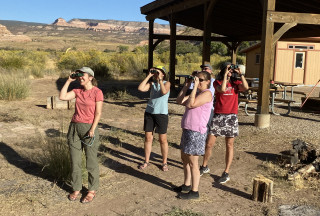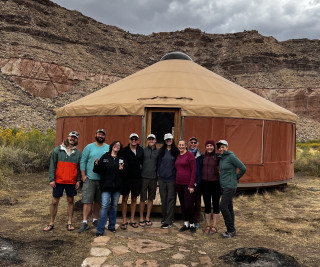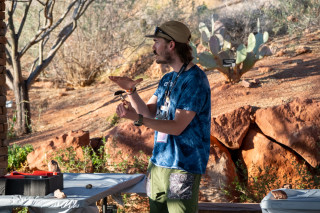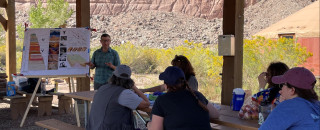Museum Ecologist for Teachers: Desert Ecology

Applications for 2025 have closed
Keep reading to learn more about this Museum Ecologist field course
In this brand-new pilot program, NHMU educators are providing an opportunity for teachers to learn more about Utah' s unique and beautiful ecosystems. Teachers will spend three full days in southern Utah exploring and studying Moab desert habitats in person. Prior to this workshop weekend, teachers will be required to explore using citizen science, complete short readings, and participate in weekly virtual meetings with enthusiasm and curiosity.
See beyond the sand and learn about the complex connectivity of desert ecosystems with hands-on activities ready for your classroom. Sleep under the brightest stars and learn to look closely and with curiosity at nature. Join us for a teacher field camp experience at the University of Utah's Bonderman Field Station near Moab, where we’ll explore these ecosystems, learn how they function, discover the unique plants and animals that call them home, and discuss how these areas are managed. Class sizes are kept small to maximize both your learning opportunities and your enjoyment!
Click here to view a full list of specific SEEd Standards supported by Desert Ecologist
What You'll Earn:
Teachers will earn 2 USBE credits and certification as a NHMU Museum Ecologist for attending the field excursions and weekly virtual meetings. Preference for future Museum Ecologist workshops will be given to those who attend this one.
Applications have closed and applicants have been informed of their status.

When:
Weekly virtual classes with corresponding readings September 8 – October 13, 2025, culminating in three field days October 17-19, 2025.
Our online Zoom classes will be held from 5:30pm -6:30pm. Classes with guest speakers will be recorded for asynchronous viewing, though your participation and attendance is highly recommended
Class Schedule
Friday Sept 12 - Zoom Class 1 – Introduction
Monday Sept 15 – Zoom Class 2
Monday Sept 22 – Zoom Class 3
Monday Sept 29 – Zoom Class 4
Monday Oct 6 – Zoom Class 5
Monday Oct 13 – Zoom Class 6 – Preparing for Excursion
Friday Oct 17 to Sunday Oct 19 - In-person field days and camping at Bonderman Field Station
Who:
K-12 public and charter school teachers in Utah
Cost:
FREE - food, transportation, and accommodations will be provided, made possible by funding through the iSEE program.
Applications for 2025 have closed. Check out our other free teacher PD opportunities!
Due to the nature of the Desert Exploration course, we will be camping in an off-grid wilderness space. Day activities will include walking and hiking over uneven, often rocky, terrain in unpredictable weather. Participants should be comfortable hiking at least 2 miles at a time. While we do our best to accommodate people of all abilities, attendees will need to be comfortable with these camping arrangements.
Accommodations:
You will have the opportunity to stay in one of the cabins at Bonderman Field Station, each of which is equipped with two or three cots. This means everyone will be sharing a tent with one other person. There is also plenty of room adjacent to the cabins for individuals to pitch their own tents. Bonderman Field Station has a shower/bath house and shade pavilion that will be open for our use during the program.
Basic Details:
We will depart from the Natural History Museum of Utah at the University of Utah on Friday morning in Museum vehicles. It is approximately a 4 – 5 hour drive, so we will plan to arrive at Bonderman Field Station on Friday evening. We will depart Bonderman Field Station on Sunday afternoon and arrive back at the Museum on Sunday evening.
All your meals, with the exception of breakfast on our departure day, will be covered by Museum funds. If you have any special dietary restrictions or allergies, please let us know in advance.
Since we will be camping in a remote location, cell phone service is limited.
If you have questions about this program, please email MuseumEcologist@nhmu.utah.edu

